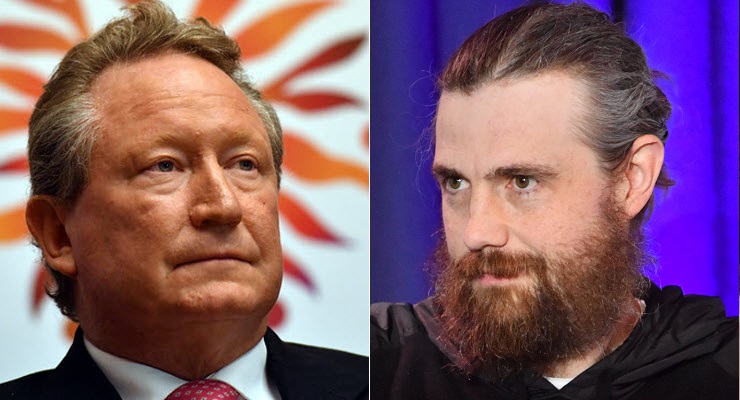
Australia’s green energy transition will not just magically happen — it needs to be made to happen. The key is having the various efforts required — financial capital, engineering, government support and environmental regulation — all working in concert.
Most modern economics is about how to allocate resources, either through the invisible hand of the market or the visible hand of the firm. And, of course, how government can best assist — either by internalising externalities or by getting out of the way.
But there is a more recent strand of economics that focuses on how economic activity is coordinated.
One way of thinking about our green energy problem is that we need somebody to act as what Robert Akerlof and I call a “mover and shaker”. That somebody needs to be central in the economic network.
The idea is simple enough.
Let’s call that central actor David. Suppose that you and I don’t know each other, but we both know David. And we both know that we’re connected to David because, well, everybody knows David.
This means that if David thinks that, say, green hydrogen is a good idea that will work then I know that because I’m connected to David. You also know that because you’re connected to David. And here’s the rub: I know that you know it and you know that I know it. In the language of game theory, it becomes common knowledge that green hydrogen is a good idea because of David’s involvement and connectedness. Nobody other than a central player can do the trick.
And the “trick” in this instance is coordinating the disparate people and activities that an epoch-making event like a green energy transition requires.
Steve Jobs was the mover and shaker of the personal computer revolution. Bill Gates was the mover and shaker of the software revolution. Elon Musk has done it for electric cars. And William Zeckendorf was the mover and shaker of real estate in the United States in the 1950s and ’60s (responsible for, among other things, bringing the United Nations to New York).
Who will be Australia’s green energy mover and shaker? Two leading candidates are Andrew Forrest and Mike Cannon-Brookes. Both are wealthy. Both are passionate about green energy. Both are household names in Australia. Both are politically connected. Both have a “look”. Will it be one of them?
One of the downsides of economics is that it can be a bit technical. But an upside of all the maths is that it affords precision. In thinking about movers and shakers, the formal framework for thinking about it shows that talent matters, but is not dispositive.
Suppose potential movers and shakers differ on three dimensions of ability: managerial skill, talent at communicating with investors, and how much capital they have. It turns out that the successful mover and shaker need not be the best of any of these, but they cannot be too weak on any.
In other words, the ability to move and shake is part skill and part luck.
There is good reason to believe that both Forrest and Cannon-Brookes are sufficiently talented on all three of these dimensions of ability, and are central enough to successfully coordinate the disparate constituencies that need to be brought together.
But there is one other crucial ingredient: the underlying technology. While the triumph of VHS over Betamax is a cautionary tale in a world where coordination is king, the best technology need not win out. But as with movers and shakers, technology cannot be too bad and still win out.
Here Forrest and Cannon-Brookes differ — sort of. Forrest is betting heavily on hydrogen. Cannon-Brookes has put down chips on battery technology and clean energy retailing. Interestingly, they are both early backers of Sun Cable, an ambitious project aiming to export green energy from the Australian outback to Singapore. Maybe that’s revealing.
In any case, it’s not easy to be a Jobs or Gates, a Musk or Zeckendorf. But it is the one essential ingredient in technological revolutions that requires a magical combination of skill and luck. Are Twiggy and Mike our green energy movers and shakers?
I hope so.








This is what passes for logic in economics!
Premise 1: Significant advances in commerce require the coordination of a single person possessing both luck and skill
Premise 2: This is proven by past significant advances in commerce that have been enabled by single persons possessing both luck and skill.
Conclusion: Therefore, significant advances in commerce require the coordination of a single person possessing both luck and skill.
And, of course, Gates, Jobs, Zuckerberg et al were all sole traders. None of them had a huge technical and marketing organisation behind them. They weren’t marketing figureheads in any way.
Finally, governments can ‘internalise externalities’. Just so long as they don’t do anything awful, like implementing a carbon tax.
Bring on a carbon tax
And none of them got a government dollar…. certainly not true in the case of Gates and Jobs.
kinda feels like something governments could do?
Oh you are cynical jaywhar . . . but correct!
Twiggy and Mike both have the money, political connections and green energy passion. Both, I assume, would wish to be the one to be seen as the Green Energy Hero. Here’s an idea, do it together fellas. Put aside the egos, pool some finances, be heroes together. You will get a huge heroes welcome from most Australians I’m guessing !
There is no point in waiting for the Government to bring us green energy relief. They will continue to cry poor and then continue to pour millions upon millions of dollars into defence !
tl;dr Having lots of money means you get to mix in circles that most cannot, and do things that most cannot.
Certainly twiggy is way ahead of anyone with his green H2 plans but so far all talk. The real test when he has to put his $1 billion down to actually build something
It takes years to get a big project up. And as there’s currently no big market for hydrogen….
“… so let’s wait until there is one and then play catch-up of all those out in the lead”.
That’s how we’ve always done it – telex pre WWII, electric PABX, black box, cochlear implant, Jindalee and, forerunner of the cruise missile, the Jindivik.
Stephenson’s first steam engine was built in his backyard (supposedly), as were the first Apple computers. Bill Gates wrote a little DOS program. Maybe some tinkerer will produce the first hydrogen motorbike. Four years ago the CSIRO announced an invention that converts ammonia to hydrogen on demand, thus negating the need for cryogenic liquid tanks to move large quantities of hydrogen or high pressure storage on location. Years ago solid state hydrogen disks (now ultra thin tape drives) were developed. I thought both of these technologies would lead somewhere, but obviously not.